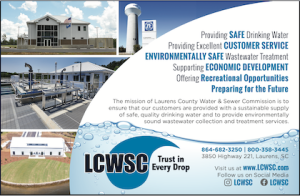Ensuring Safe Drinking Water: The Mission of the Laurens County Water & Sewer Commission
July 10, 2024In Laurens County, the Laurens County Water & Sewer Commission (LCWSC) is committed to providing the community with a sustainable supply of safe, high-quality drinking water. This mission is part of a larger effort to support public health, environmental sustainability, and economic growth in the area. According to LCWSC Director Jeff Field, “Our goal is to ensure that every resident and business in our service area has access to clean, safe water. This commitment drives everything we do, from daily operations to long-term planning and infrastructure improvements.”
The Safe Drinking Water Act: A Framework for Protection
The Safe Drinking Water Act (SDWA), passed by Congress in 1974 and amended in 1986 and 1996, serves as the foundation for drinking water safety in the United States. This landmark legislation authorizes the Environmental Protection Agency (EPA) to set national health-based standards for drinking water to protect against contaminants, both natural and man-made. The EPA works in conjunction with state and local water systems to ensure these standards are met, providing millions of Americans with high-quality drinking water every day.
However, maintaining safe drinking water is a complex challenge. Threats such as improperly disposed chemicals, animal waste, pesticides, human activities, and naturally occurring substances can all contaminate water sources. The SDWA mandates a comprehensive approach to water safety, encompassing source water protection, operator training, funding for water system improvements, and public information.
Protection and Prevention: Key Components
To safeguard drinking water, states and water suppliers conduct thorough assessments of water sources to identify vulnerabilities to contamination. Voluntary programs to protect watersheds and wellheads, along with legal measures to prevent pollution, further bolster these efforts. The SDWA also requires states to certify water system operators and ensure that new systems have the capacity to deliver safe water. The Underground Injection Control (UIC) program, part of the SDWA, regulates the injection of wastes into groundwater, setting standards for safe practices and banning certain types of injection.
Setting and Enforcing Standards
The EPA sets national standards for tap water to ensure consistent quality. These standards are based on health goals that consider risks to vulnerable populations, such as infants, children, pregnant women, the elderly, and those with compromised immune systems. The EPA establishes legal limits or required treatment techniques for contaminants, aiming to be as close to health goals as feasible while also considering cost-benefit analyses and input from stakeholders.
Informing the Public
Public awareness and involvement are crucial to the success of the SDWA. Water suppliers must notify consumers promptly about any serious water quality issues. Annual consumer confidence reports inform residents about the source and quality of their tap water. Additionally, the EPA and states publish annual reports on water system compliance, ensuring transparency and accountability.
LCWSC’s Commitment to Quality and Growth
The LCWSC’s mission aligns with the principles of the SDWA. “Our dedication to providing safe, quality drinking water is evident through our operations, outreach initiatives, and efficiency of services,” says Field. “We are constantly working to support the infrastructure needed for effective economic growth in our area.” The commission’s efforts include maintaining and upgrading water systems, adopting best practices for water treatment, and engaging with the community to promote water conservation and safety.
As Laurens County grows, the LCWSC is prepared to meet the increasing demand for water services. By investing in infrastructure improvements and staying ahead of potential challenges, the commission ensures that the community will continue to enjoy safe, reliable drinking water for generations to come.
The LCWSC’s commitment to providing high-quality drinking water reflects its broader dedication to public health, environmental stewardship, and economic development. Through adherence to the principles of the Safe Drinking Water Act and proactive engagement with the community, the LCWSC stands as a vital guardian of one of our most essential resources.




















